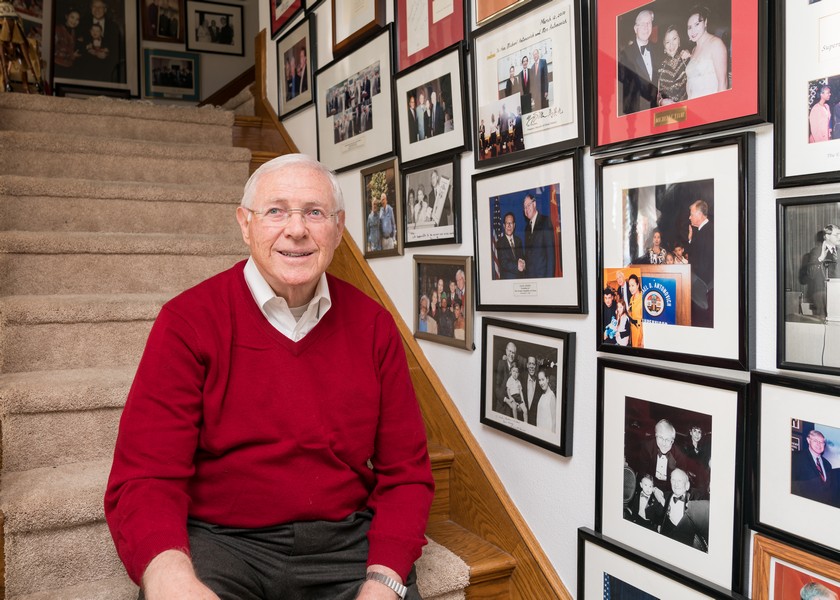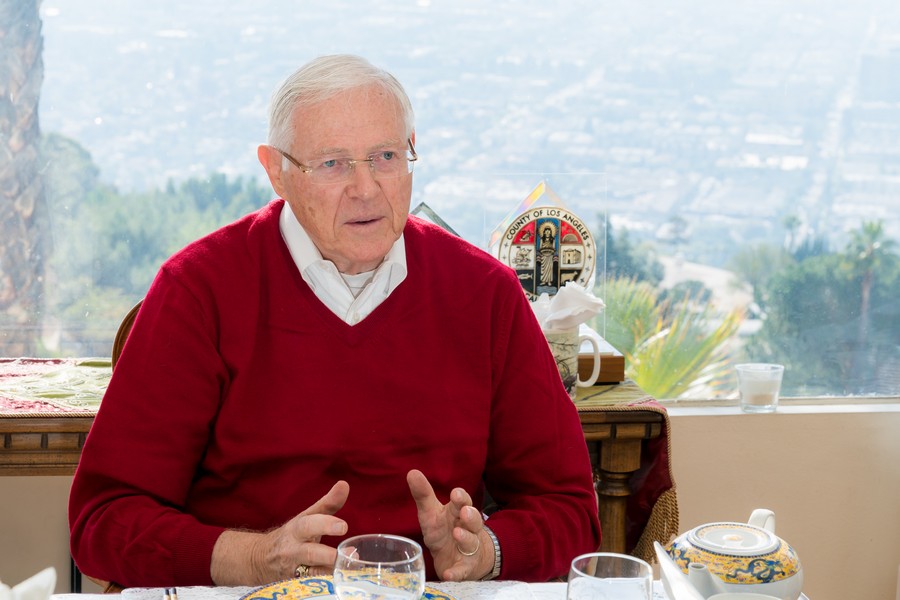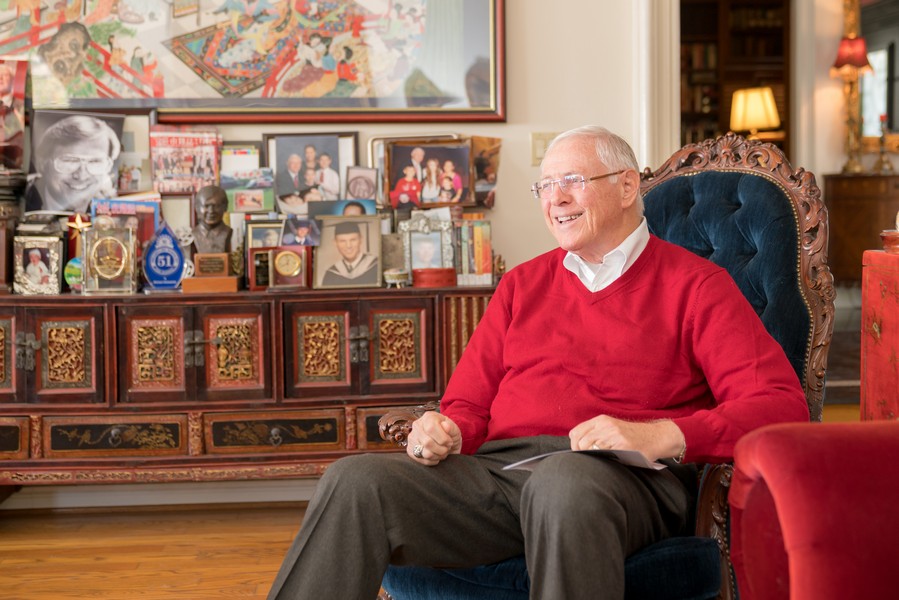On the surface, Michael D. Antonovich's (Cal State Los Angeles) Glendale, California residence resembles that of many retired politicians: a hillside home that overlooks the city; picture-lined walls capturing photo ops with presidents, foreign dignitaries and celebrities; and a dusty, out-of-use office long past its glory days.
More impressive than the photos with Senator Dianne Feinstein, President Ronald Reagan, Ray Charles and Kurt Douglas—all signs of a very public life—is the realization that Michael Antonovich is truly a public servant. He served his country, his state, his county. But never, Michael is quick to tell me, at the expense of his family.
“I try to see all my kids’ activities,” Michael begins. “When I can’t, they know that’s the exception, not the rule.”
His home is a reflection of the life he led for more than four decades, as a full-time politician and an equally full-time devoted dad and husband. The only pictures that outnumber those of public figures are those of his family, son Michael Jr., 18, daughter Mary Christine, 17, and wife Christine.

In 1972 Michael Antonovich joined the California State Assembly, where he served part of Los Angeles County for three terms. After garnering experience at the state level, Michael joined the Los Angeles County Board of Supervisors in 1980. He served on the board for 36 years, including eight as chairman, until his retirement in the fall of 2016.
Honoring campaign promises was important to Michael from the inception of his political career. “What I found frustrating is you would have people [...] picking one position at election time and voting the other way once they were in office,” Michael divulges. “And I said if I was ever elected in office, I would work to implement those ideas. I was elected, and I’m pleased that I did not deviate from the issues I campaigned on.”
Greatest Achievements
When asked about the crowning achievements of his near-four decade career, he immediately spoke about bringing attention to the issues facing foster and emancipated youth. I was struck not only by the macro-level change he implemented through a state-wide bill that extended services to foster youth past the age of 18—but also by the micro-level change he participated in, illustrated by the story he shared:
“Judeana Burke was a foster child at MacLaren Hall. I gave her an opportunity as an intern in my office and she ended up receiving her bachelor’s degree, and I had the privilege of being the commencement speaker at Cal State L.A. [California State University, Los Angeles] when she received her master’s degree two years ago. Today, she’s the executive assistant to the CEO for the county of Los Angeles. A few years ago she married a boy who was also from the MacLaren home.”
Michael is proud that he played a part in her journey, however small. As county supervisor, Michael continuously searched for ways to effect change, even on an incremental level.

For example, as chairman of the L.A. County Metropolitan Transportation Authority, (the third-largest public transportation system in the US), in 2012 he implemented the Youth on the Move program to give free bus and rail passes to youth who had recently exited the foster care system.
Anyone familiar with Los Angeles’ sprawling metropolis knows that reliable transportation is a necessity, almost as much as food and shelter. A “small thing” like a bus pass can yield huge returns in terms of access to work and financial stability.
Michael lauds the program’s success: “Now the kids—they could go to school, they could have a job, they could go to the beach or whatever they wanted to do.”
The Youth on the Move program was established under the Los Angeles County Youth Self-Sufficiency initiative, an initiative that Michael’s office designed to help kids transition from foster care to independent living.
Michael’s passion for serving foster kids and newly emancipated youth extends past his official role as county supervisor. It also compelled him to start the Michael D. Antonovich Charitable Foundation in 2004, a public benefit corporation created to prevent cruelty to children and animals.
Early Career
Michael’s resolve to improve the lives of young people originated in his pre-political career. He discovered his first career as a fifth grade student in Mrs. Sara Schaefer’s class at Russell Elementary School. “I wanted to be a teacher,” Michael explains, “because she was a great role model.”
Mrs. Schaefer kept in touch with him throughout the years—as he served in the United States Army active reserves and inactive reserves, founded the Cal State Los Angeles Sigma Nu colony (he was pin number one), and served as Commander.
Once Michael graduated from Cal State L.A. in 1966 with his teaching credential and secured a few years of teaching experience at the high school level, Mrs. Schaefer encouraged him to run for the Los Angeles Community College District Board of Trustees, the local board that oversees community college education. Surprisingly, Michael nabbed a spot on the board in 1969. He finished second, right behind Jerry Brown, California’s future governor.
Michael’s aforementioned work in the California State Assembly and County Board of Supervisors followed.
The Role of the County Supervisor
“The county supervisor has legislative, executive and judicial powers,” he explains. “It’s like being a governor of a state.”
He’s right. Los Angeles “is just one of our 88 cities,” and Los Angeles County is larger than 42 states.
As county supervisor, Michael was one of five elected board members; he represented the 2.1 million residents of the 5th District, a massive territory that includes Burbank, Glendale and parts of northern Los Angeles.
A walking encyclopedia, the 78-year-old easily rattles off L.A. County stats: its 10.2 million person population,1.5 million residents living in unincorporated areas and 30 billion dollar budget.

Los Angeles County isn’t just a place where Michael worked, and the pictures that adorn the walls of his home aren’t merely for show; this residential “museum” documents a life of service.
“That’s the Pope John Paul,” Michael notes, while giving me a tour.
“There’s Margaret Thatcher and my wife,” he adds, pointing to another photo.
His home gallery is a who’s who in American politics: Presidents Clinton, Reagan, Ford, Carter, Nixon.
Supporting Families
Michael’s ardent belief in the power of strong family guided much of his work. After he received a particularly moving letter from a constituent about her daughter’s kidnapping, Michael authored new state legislation, California Assembly Bill 3296. He shares the harrowing story:
“Her ex had taken her child to another state. Well because it was a misdemeanor, the federal government was not involved and district attorneys don’t really pursue misdemeanors…”
Michael explains that a kidnapper could easily transport a child to a foreign country and escape authorities because unfortunately neither the state nor the federal government considered the crime worthy of international pursuit.
“So we made it a felony and as a result of that, now the federal government gets involved.”
Family Matters
If charity begins at home, then so does caring for families. Pre-retirement, Michael used every opportunity to include his children in his work, whether it was attending a rhythm and blues concert sponsored by the county, touring the county jail, or paying their respects to President Reagan at the Reagan Presidential Library after his passing.
When Mary and Michael Jr., both avid fans of the hit TV show, NCIS, showed interest in forensic medicine as a career, Michael Sr. used his connections to secure them a visit to a coroner’s office.
Post-retirement, Michael is a self-proclaimed “Mr. Mom.” Additional titles include “Driver-in-Chief” and “Full-time Soccer Dad.”
Unprompted, he reports his son’s latest stats to me: “They won three to one, and he scored three goals.” He tells me this two times—one at the beginning of our interview, and the other at the end.
He whips out his phone to show me a picture of his namesake, unaware or unconcerned that the photographer is waiting to take his photo. “This is last Sunday’s soccer game. There’s Michael.”
Michael Sr. discloses that a month prior, Mary suffered a concussion during a game and has just been cleared to play again. “Yesterday was her first day playing,” he points out, “and she played the whole game.”
He is a beaming papa, proud of his children and the opportunities his work has afforded them: “They’ve been exposed [to] and learned from a lot of experiences, and that’s why I support these programs where children have opportunities to go to the capital, to be involved with some of these programs…so when they grow up they have goals that they’ll be able to achieve.”
Legacy
His impact on the communities he’s served is evidenced by the public locales that bear his name: the Antonovich Nature Trail, Michael D. Antonovich Regional Park at Joughin Ranch and Michael Antonovich Antelope Valley Superior Court.
Yet, this is not how Michael defines his legacy. “Glory is always fleeting,” he declares, quoting the movie Patton. “What is not temporary is helping to provide the leadership of helping a youth become a productive citizen. So the saying that you can have all the certificates and trophies and accolades and money, which means very very little in 100 years, but if you reach one person, that will have a greater benefit than all of the other awards that you may receive. I believe that.”